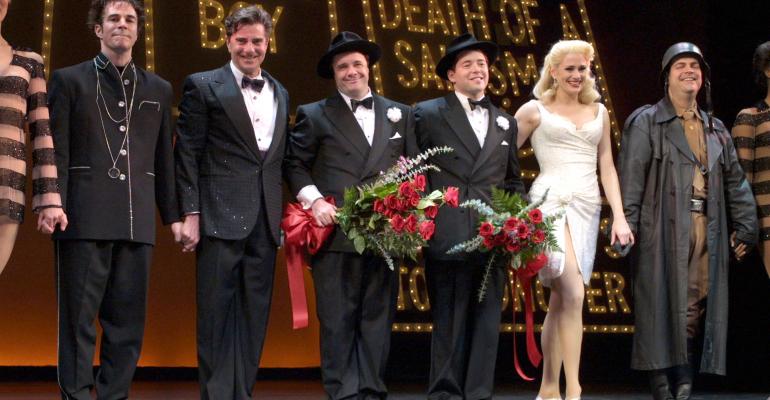I’ve always said that I could write a hysterical Broadway comedy based on the day-to-day craziness that is my estate-planning law practice. Jason Alexander would be the perfect actor to play my role in the production, with Carol Burnett as a whacky client, Tina Fey and Amy Poehler as a couple of paralegals, Bob Newhart as a retiring law partner and others to round out our distinct cast of characters. It would be a hit!
While I’m sure you’ll laugh considering which famous actors best represent your office, to create the intended client experience, it helps to think of your law practice as theater.
Pre-Production
In theater, there’s pre-production work, such as creating the play’s theme as well as writing the script. This speaks to the experience that the playwright intends for their audience to have, whether it’s to be a comedy, drama or tragedy. When transferring this idea to your estate-planning practice, you should first envision the client experience you want to create.
This experience starts with the initial client contact either through the Internet, email or telephone, through the time that the client walks into your office. What does your set (office) look like? Is it welcoming? How will the ushers (receptionist) greet your clients? Will it be by name? What does your program (initial client package) contain?
In their book, The Experience Economy, Joseph Pine II and James H. Gilmore argue that successful businesses orchestrate memorable events for their customers and that the more advanced “experience” businesses charge for the transformation that the experience offers. This is how, for example, Disney can charge $40 for a breakfast when you can purchase the same food at First Watch or Denny’s for $8. The experience that you and your family have when Mickey Mouse and company interact with your children commands a premium.
Pine and Gilmore identify four possible experience realms that businesses can offer: entertainment, esthetic, escapist and educational. Entertainment experiences include the Disney and Universal theme parks, as well as Internet social media, gambling and even pornography sites. Bass Pro Shops, REI Outfitters and Canyon Ranch Spas offer esthetic experiences, immersing their customers in a world different from their own to create the desired effect. Backroads Travel Company, Regent Seven Seas Cruise Line and Four Seasons resorts are great examples of escapist experiences. Thinking about these examples, it’s easy to see how many businesses contain elements of more than one type of experience.
Obviously, those of us in the estate-planning arena will look toward the educational realm to provide unique client experiences. Therefore, when considering the experience you wish to create, how are you going to build an educational experience that transforms your client? Will your website offer information beyond boring articles describing wills, trusts and probate? What interactive materials, videos, webinars and podcasts might be built to set the stage for your client experience? How do those materials coordinate with everything else you offer?
Production
The production is the actual client experience itself. The goal of any estate planning practice should be to provide a uniquely positive client experience that can’t be replicated anywhere else at any price. I call this the “value creation practice.” When you consistently succeed in providing your clients with this type of experience, then you’ll never have to worry about having enough business. Your biggest concern will be to determine which clients to accept and which not to.
Determining how to replicate your intended experience is the tough part. This requires what Pine and Gilmore refer to as “front stage” and “back stage” processes. In my last column, I asked you to think about the steps that you took when you considered how you served your three best clients. What your client experienced was the front stage.
What you and your team did for the client to enjoy the frontstage experience is your backstage. Most offices operate on what I call the “Talmudic” version of getting things done. This refers to the ancient Jewish Rabbinic texts that were passed down orally from generation to generation. It wasn’t until the Babylonians destroyed the First Temple in Jerusalem in 587 BCE that these oral laws and traditions were transcribed into the written word. The problem, of course, with the Talmudic version of operating your office is when a staff person leaves, all of their wisdom and knowledge leaves with them.
Therefore, it’s important to document each and every one of your backstage processes. This includes everything from how the receptionist should answer the phone to how the finished client documents are delivered. Most importantly, documenting processes allows your team members to grow into new positions you’ll need as your practice grows, leaving behind a complete training manual for those occupying the prior position.
Post-Production
Uniquely positive client experiences shouldn’t end with the delivery of your clients’ completed documents. You realize that sticking an estate plan in a drawer for years is asking for trouble. This is your opportunity to further educate your clients and provide greater value. Do you offer a maintenance program that promises to keep your clients documents up to date for a fixed fee? Do you provide ongoing educational workshops, webinars, podcasts and newsletters to keep your clients abreast with the ever-changing estate, trust and tax laws?
These are all methods that create an ongoing relationship, which, if you’ll recall, is one of the foundations for providing client value. Moreover, scheduling continuing client events builds a community of like-minded clients. And we all know the adage of “birds of a feather flock together.” This is why I promised creating client value through educational experiences will develop client loyalty that results in increased business.
It may seem obvious to you that a typical estate-planning practice that includes an attorney and a legal assistant or two isn’t sufficient to create these transformative client experiences. In my next column I’ll describe how you might go about building a team to create the best estate-planning practice in town.
Until next time.





